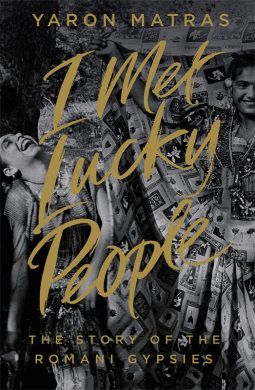
I met lucky people
The story of the Romani Gypsies
by Yaron Matras
This title was previously available on NetGalley and is now archived.
Send NetGalley books directly to your Kindle or Kindle app
1
To read on a Kindle or Kindle app, please add kindle@netgalley.com as an approved email address to receive files in your Amazon account. Click here for step-by-step instructions.
2
Also find your Kindle email address within your Amazon account, and enter it here.
Pub Date 6 Feb 2014 | Archive Date 31 Mar 2014
Penguin Books (UK) | Allen Lane
Description
Their own origins myths put them at the scene of the Crucifixion, deprived of a home of their own, doomed to a life of wandering, and granted by God the right to steal from other people in order to survive. In the Middle Ages, it was believed they had come out of Egypt. And yet their language shares a number of words with Greek, and has its roots in India. So who are the Romani people, really?As one of the last remaining societies in the Western hemisphere with a strictly oral culture, the Romani people have no written record of their history that can be consulted. From the early 1990s, linguist Yaron Matras has been working with the 'Rom', as they call themselves, one of a handful of people to have done so. Travelling widely in central and eastern Europe, studying their language and learning their dialects, he has witnessed their campaign for recognition. In I Met Lucky People Matras gives us the first comprehensive account of their culture, language and history. It is a story of the echoes of a rich past left in language and customs, and of how the changing fortunes of Europe throughout the centuries have been imprinted on Romani culture.The Romani people are a nation like few others: without territory, national sovereignty or formal institutions, and with no tradition of agriculture or ownership of land. As the wider global society that surrounds them struggles to define itself, what will become of the Roms? Unlike other groups who have won a measure of inclusion in recent decades, they have struggled to have their voice heard. If they are to have a future, it is time we brought our thinking about them out of the dark ages and into the modern world.Yaron Matras is Professor of Linguistics at the University of Manchester, and Editor of the journal Romani Studies. His involvement with Romani issues began in the advocacy and civil rights arena. Matras was media relations officer to the Roma National Congress from 1988 -1995, and founding editor of RomNews, one of the very first advocacy information services on Romani issues. He has worked closely with the Open Society Institute's Roma programmes, is a founding member of the European Academic Network on Romani Studies, and has led several large-scale research projects on Romani language and culture, including an international research consortium on Romani migrations. He is the author of over a dozen books and numerous chapters and articles on Romani language and culture, and speaks the Romani language fluently.
A Note From the Publisher
Please note we will only accept requests from the UK and Ireland for this title
Available Editions
| EDITION | Other Format |
| ISBN | 9781846144813 |
| PRICE | £20.00 (GBP) |



